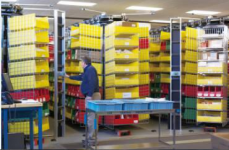
RFID medical supplies management
[ad_1]
Now that the Internet of Things is in a stage of rapid development, RFID technology has penetrated into almost every industry field. RFID technology, also known as radio frequency identification technology, is a new type of communication technology that can identify targets and read and write data through radio signals without the need to establish mechanical or optical contact between the identification system and the target. Nowadays, RFID technology has been commonly used in retail, medical, manufacturing, logistics, public transportation and other industries, bringing great convenience to people’s lives, and also making the work management efficiency of business units a qualitative leap.
In the medical field, traditional hospitals often adopt manual recording methods for information collection and recording, which can easily cause errors and confusion in information recording, leading to hospital property losses and medical accidents. In response to the above-mentioned shortcomings, more and more hospitals have begun to consider the development of hospital informatization, using RFID technology to maximize the deficiencies and inherent shortcomings of the hospital, strengthen the management of patients, medical staff and hospital materials, and improve the hospital’s comprehensive medical services level. Today, I will explain to you several application scenarios of RFID technology in material management in the medical field, so that you can have a deeper understanding of the significance of RFID technology for the medical industry.
1. Hospital warehouse management application
When medical staff enter the warehouse of hospital materials, they collect basic information such as the name, specification, manufacturer, batch number, production date, and expiration date of the materials, and then affix the RFID tags with the material information, then classify and manage them, and finally enter the materials. Warehouse storage. When materials need to be used or counted, medical staff can use the handheld terminal PDA to read the RFID tags of the materials, and then they can effectively count the quantity of materials, material usage records, and whether they are expired, etc., and improve their work in material management. efficient. Through the use of RFID technology, the hospital’s management of materials has become easier, and the hospital’s use of materials and procurement processes have been further improved, and the use of expired materials has also been prevented, effectively curbing medical accidents caused by human negligence.

2. Hospital equipment management application
In the management of medical equipment in traditional hospitals, manual recording is often carried out, and the resulting equipment loss problems occur from time to time, and the protection and access of hospital equipment information is also very troublesome. By using RFID technology, attaching detailed information RFID tags to medical equipment, and reading the RFID tags of the equipment through the handheld terminal PDA, medical staff can learn the specific information of the equipment, each time it is used, maintained, repaired and patrolled. The corresponding records of inspections can effectively prevent damage and loss caused by uncertain factors, and strengthen the management of hospital equipment. In each equipment inspection and maintenance work, data can also be written to the corresponding information, which avoids omissions in equipment management work. At the same time, it can better trace the source after the occurrence of equipment-related medical liability accidents. Find the source of the problem.

Third, the hospital smart call application
Through the use of RFID technology, the speed and communication method of the hospital’s intelligent call system can be optimized. It is no longer limited to the traditional method that can only be transmitted by voice, and can also be displayed with different audio-visual graphics. In this way, when the hospital is facing emergency patients, it can allow the personnel of various relevant departments to actively cooperate to quickly prepare and complete medical supplies and medical equipment, and at the same time, it can reduce errors caused by information errors in the preparation process and ensure that the final treatment effect is large. promote. In the process of using RFID technology, the content of the intelligent call system can also be updated in time, prompting it to make adjustments according to the hospital’s own environment to achieve better work results and improve past problems.

In the development of the medical industry in recent years, the hospital’s material management has received more and more attention. It has had a profound impact on the overall development of the hospital, social stability, and regional harmony on multiple levels. I hope that the relevant knowledge explained for you today will give you a further understanding of the material management application of RFID technology in the medical field.
[ad_2]



